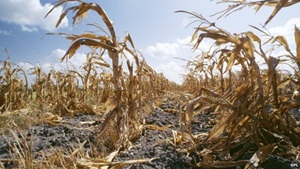
Climate change is increasing the risk of severe ‘food shocks’ where crops fail and prices of staples rise rapidly around the world.
Researchers say extreme weather events that impact food production could be happening in seven years out of ten by the end of this century.
The authors argue that an over reliance on global trade may make these production shocks worse.
The impacts are most likely to be felt across Africa and the Middle East.
Poor harvests and low stocks of grains in 2008 combined with a host of other factors to produce a spectacular price rise in cereals, with a UN index of prices peaking at 2.8 times higher than it was at the turn of the millennium.
In 2010-11, a heat wave in Russia led to the country’s worst drought in 40 years, decimating the grain harvest and leading indirectly, to food riots in North African countries as prices of bread rose rapidly.
Now researchers from the US and the UK have analysed the chances of extreme weather events causing these types of food shocks as the world warms over the coming century.
Looking at the production of rice, wheat, maize and soybeans, the scientists found that the the chances of a one in 100-year production disruption is likely to increase to a one in 30-year event by 2040.
From 2070 onward, they estimate that severe shocks, which could see global production drop by 10%, could be happening in seven out of ten years.
“It is very difficult to characterise these extreme events and their frequency, but what we do see quite clearly is that events that are very rare in the present day are becoming more frequent in the future,” said Kirsty Lewis, one of the authors, from the UK’s Met Office.
“The most extreme events of the future are likely to become more intense, so potentially larger shocks and more frequent shocks.”
The UN’s Food and Agriculture Organisation says that increasing population will drive demand for food up by 60% by 2050 in any case, so there is going to be significant pressure on food production.
“If we are coping with demand increase by sustainable intensification, but then we suddenly have a catastrophic year, and we lose a big chunk of the world’s calories, everybody will feel it.”
Prof Tim Benton, UK Global Food Security Programme
The fight against global malnutrition

- Deficiencies in key nutrients can cause blindness, a painful swelling of the neck called a goitre, stunting and a weakened immune system.
- Scientists are looking at a range of approaches to fight malnutrition – such as cultivating insects and growing meat in laboratories.
Could science improve the nutrition of millions?
Climate change could be the extra element that rapidly changes the global picture.
“We’ve got these pressures on the food system, part of which is climate change,” said Prof Tim Benton, from the UK Global Food Security Programme.
“But we’re highlighting the fact that with weather variability and increases of extremes we are adding a layer of difficulty – Because it happens suddenly within a year, it is more difficult to adjust slowly like we’d cope with demand increases.”
“If we are coping with demand increase by sustainable intensification, but then we suddenly have a catastrophic year, and we lose a big chunk of the world’s calories, everybody will feel it.”
The biggest impact of these production shocks were likely to be felt across Africa and the Middle East, said the authors.
Countries like the UK and the US would be able to cope because more processed food is consumed in the wealthier regions so the changing price of basic commodities was less of a factor in the price.

“The most vulnerable countries that are going to be worst affected are low income food-deficit countries, predominantly those in sub-Saharan Africa,” said author Rob Bailey from Chatham House.
“You can imagine that the poorest households in these sorts of countries spending upwards of 50% of their income on food. So if you are in a situation where food prices are increased by 50-100% that leaves them in an almost untenable position,” he said.
The researchers say that international trade worked well when food was in plentiful supply but when demand increased, countries often imposed export controls which usually made the situation worse.
Another factor was biofuel, where land was taken out of food production, tipping the balance towards scarcity.
The researchers say that governments must try to understand the risks, rather than simply stockpiling food and grains.
There should be efforts to reform world trade so that countries don’t retreat behind barriers when crops fail. Significant research on agriculture must be carried out to ensure it can cope with increased demand and increasing temperatures.
Developed countries may be able to ride out the worst effects of food shocks, warned Prof Benton, but there might well be other, significant impacts.
“In a sense what we’re living with Isis today came out of a spark that came from food price rises,” he said.
Source: BBC News – Global Warming Increases ‘Food Shocks’ Threat








